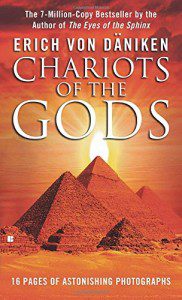
When I was a kid I figured we’d be a star-faring civilization by now. Things seemed to be trending in the right direction. At least we should be driving levitating cars. The future has been something of a let down.
Also, I liked anything to do with UFOs, especially stuff like, Chariots of the Gods. (If you’re as old as I, you may recall the book.)
Here’s how it goes: ancient civilizations were enriched by visits from above. What our ancestors mistook for gods were actually extraterrestrials. The pyramids, hieroglyphics, celestial calendars, they all contain clues suggesting we didn’t pull ourselves up by our intellectual bootstraps. No, just about every technological breakthrough that made the great civilizations possible should be attributed to the condescension of our alien betters.
Once you accept the premise, it is only a short step to believing that even our biological evolution might have come about by help from above, like we see in 2001 A Space Odyssey.
SETI
I’ve discovered that I’m not alone. My interest in extraterrestrials, and my hope that we will actually discover some, is shared by other people. Even by people with deep-pockets and advanced degrees in the sciences.
SETI, the “Search for Extraterrestrial Intelligence” was a pet interest of Carl Sagan. And while I don’t share much in common with the good professor, I do share an enthusiasm for this. Folks who’ve read this blog know I’m not a fan of government bureaucracy, but I’d be willing to increase NASA’s funding 1o fold. (Here’s a better idea, shut down half the government and just channel the funds to NASA. The best of all possible worlds.)
Anyway, the search has been something of a disappointment. With the age of the cosmos, and all those probable worlds out there that must be teeming with alien life, where are all the aliens?
Turns out there’s a name for this. It’s called, The Fermi-Paradox. Here’s a delightful animated explanation of the paradox. Have a look–
Blinded by Science
I’m not a scientist, and I don’t play one on television either. Nor am I a mathematician. But I do know something about the history of western thought, and I can’t help but say, the premise the Fermi Paradox is based upon is embarrassingly stupid.
The premise is this: Intelligence = Technology. The more intelligent you are, in this little equation, the more sophisticated your technology will be.
Really? Begs the question, seems to me. If true, you can pretty much write off as stupid anyone who doesn’t live in a technologically advanced society. Not only would that include people in the Middle Ages (a favorite whipping boy), it would include aboriginal peoples all over the world today (a not so politically correct kid to pick on).
Not only that, the whole thing is purported to be quantifiable. Really? Can we really sum up the rise of science with laws of probability? It also smacks of materialism, material laws leading inevitably to certain outcomes if conditions permit.
What about freedom and serendipity? I know, I’m one of those religious obscurantists. Those things don’t count. (They really can’t be counted, which may be one of the reasons why materialists don’t like them.)
Seeing the Light
Scientists are supposed to be interested in facts. One fact many of them seem to have no interest in is the fact that experimental science emerged in a Christian civilization.
The way many of these people suppress this inconvenient truth is with a creation myth. The myth was created during that self-congradulatory era known as “The Enlightenment” and it goes something like this: formerly we labored under a monkish ignorance of blind faith, but then the light of reason dawned! Modern scientists popped into existence sui generis, out of thin air! And we’ve been climbing the ladder of knowledge ever since.
There are a number of problems with this creation myth. First of all, it is a plain lie.
The truth is at least four intellectual antecedents had to exist prior to its advent to make room for experimental science. Without those what we call science today, the systematic documentation of material causation, could not have come about. And quite embarrassingly so, these articles of faith have religious roots.
Here they are:
- The material world is good. You may think this is obvious, but you are wrong if you do. Many intelligent people throughout history did not believe this. For these folks (and we still have some of them with us) the world is a place of suffering and death, and those aren’t good. I’m not sure how science could have emerged without the conviction that the material world is good. Here’s where the Abrahamic religions have an advantage. God made the world according to these religions, and he declared it good. In Christianity this was strongly reinforced by the doctrine of Christ’s incarnation. (God wouldn’t take on a human body if our bodies were not good.)
- The material world is ordered rationally. The Greeks gave us this insight by discerning the Logos that orders the world. Because we are rational (sometimes), we can see the reasons things are the way they are. Again, this is not altogether obvious. Because causes are sometimes hidden from view, events can seem to come about by caprice. So why didn’t science as we know it get off the ground in ancient Greece? They lacked an insight that the Abrahamic religions possessed, which brings me to my next point.
- Time moves linearly. This is another one of those things we take for granted today that people in the past did not take for granted. Think about it, don’t we live in a series of cycles?: the days, the weeks, the years, generations coming and going, civilizations rising and falling. We don’t seem to be getting anywhere. But with the Abrahamic religions we have a transcendent God who lays out time on a line. There is a beginning and there will be an end. Without linear time causes fold back in upon themselves. There’s no point to anything, and nothing really new to learn.
- Nominalism: things are themselves. The last thing on my list is a paradox in itself. Nominalism, a theological innovation intended to free God from necessity and preserve his freedom to make whatever he pleases, willy-nilly, freed the world from necessarily meaning something. The world is no longer just a sign pointing beyond itself. Sure, it may call for something to bring it into being. But where that leads is Deism. Atheists have been taking potshots at that ever since. But that God is not the God of classical theism. Nominalism arose somewhat simultaneously in Islam, Judaism, and Christianity in the late Middle Ages. Big books have been written about it.
Science on Other Planets?
With these things in mind, science strikes me as something less than inevitable. It strikes me as something altogether contingent, even somewhat miraculous, something requiring intervention from the outside to bring about. Something along the lines of Chariots of the Gods.
Or maybe, I know it sounds crazy, just maybe Christianity actually has it right: the true God made us and came down to save us, and that’s the big reason we have science.
You know, it’s sort of funny that Arthur C. Clarke and Richard Dawkins, two vociferous atheists, found it necessary to play the extraterrestrial card–Clarke in 2001, A Space Odyssey, and Dawkins infamously when trying to explain why life came about on earth.
The problem, naturally, is these explanations don’t actually explain anything. Even if intelligence began elsewhere and was given to our primate ancestors (Clarke), or life was seeded by some external source (Dawkins), we still haven’t discovered the true origins of those things.
If this analysis is right, what we may have (who knows?), is a universe filled with intelligent life, stuck in a stone age, or a bronze age, or some other age we would look down upon. We may be the only form of intelligent life in the universe with space travel.

A Mission to the Stars?
Please permit a flight of fancy. (Fortunately it is mere fancy, C. S. Lewis, I think plausibly, in his essay, Religion and Rocketry, proposed that the vast interstellar distances that keep us at home are a sort of quarantine.)
But here goes: why not us? Why shouldn’t we be those charioteering gods?
I write science fiction from time to time. And among the story ideas I’ve played around with is just this thing. Our children have ventured into the cosmos only to discover to their great disappointment, that they are surrounded by primitives.
But one group, amid great controversy, takes it upon itself to perform the work of uplift.
I wonder, who they could be?
Maybe Jesuits?












